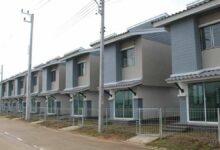Mortgage rejection rates to rise for homes under 3 million baht

Mortgage applications for homes priced below 3 million baht are expected to continue facing high rejection rates for the next two years due to a slowdown in the residential segment.
A research centre under the Siam Commercial Bank Economic Intelligence Centre (SCBEIC), reports that house sales priced under 3 million baht in the Bangkok Metropolitan Region (BMR) are likely to experience a downturn for one to two years. This trend is attributed to a weaker economic recovery, higher regular expenses, and the debt burden on the household sector, particularly among the lower to middle-income segments.
Houses in this price range in the BMR represent two-thirds of transferred units and account for one-third of the value of transfers. The research centre noted that interest rates and the loan-to-value (LTV) ratio set by the Bank of Thailand, which ranges from 90% to 100%, are limiting factors for homebuyers seeking mortgages, said the SCBEIC.
“The mortgage rejection rate for houses priced below 3 million baht is expected to increase in line with the property market slowdown for one to two years.”
Recently, the central bank announced a relaxation of the LTV ratio, allowing banks to offer a ratio above 100% exclusively to homebuyers participating in a debt consolidation programme. However, the standard ratio remains unchanged at 90% to 100%.
The Secretary-General of the Housing Finance Association, Alongkot Boonmasuk, indicated that the mortgage market is expected to slow down in the latter half of this year, continuing a trend observed in the first half that aligns with the overall property market.
Loan rejections
He said homebuyers with lower to middle incomes, earning less than 30,000 baht per month, remain pressured by loan rejections.
Property developers have shifted their focus to buyers earning more than 30,000 baht per month, promoting houses priced between 3 to 7 million baht per unit, Alongkot added. Developers are also targeting foreign buyers with strong purchasing power to support sales.
In light of the market slowdown, developers have recently requested soft mortgage measures from the finance ministry to support the industry and are advocating for further easing of the LTV ratio.
The LTV ratio easing for debt consolidation conditions would not support housing loans nor the property market overall, Alongkot said.
“We understand the central bank wants to contain household debt. These restrictions also impact homebuyers, especially those in segments with real demand.”
Bank of Thailand data reveals that the country’s household debt-to-GDP ratio was 90.8% as of the first quarter of this year.
Mortgages represented 34% of total household debt, personal loans accounted for 25%, occupation-related loans made up 18%, auto loans 11%, credit cards 3%, and others accounted for 9%, reported Bangkok Post.
Latest Thailand News
Follow The Thaiger on Google News:


























